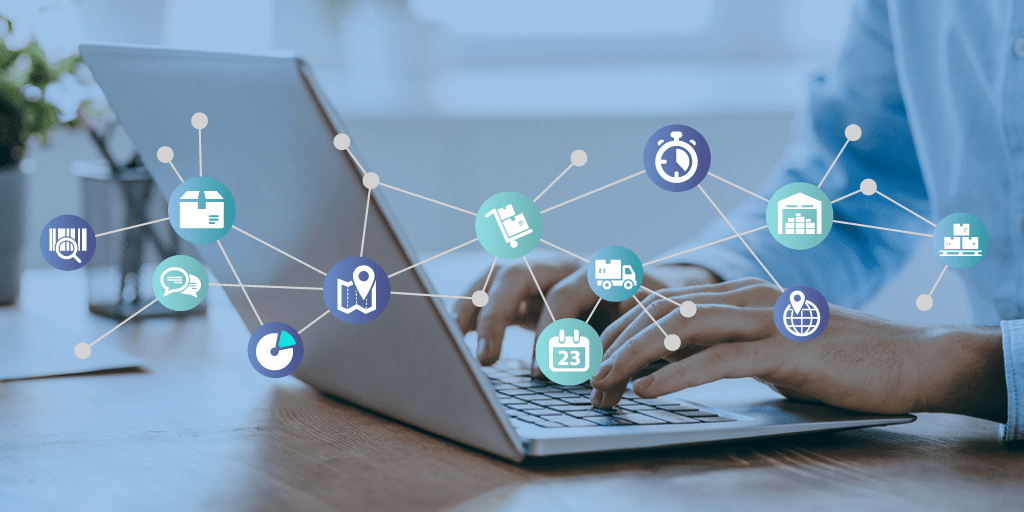The Current Pulse of Businesses Who Ship Parcel & Freight
Businesses are in triage-mode right now. An excellent resource we've been following to stay on top of things is USC Marshall's webinar series on...

In this post, we look at how technology has been evolving over the last few years in shipping and freight, where it's heading, and what Trimble's recent acquisition of Kuebix means.
The shipping and freight world traditionally lacks standards and involves hundreds of thousands of companies managing their individual supply chains across very segmented modes of transportation (i.e., rail, trucking, ocean, air, etc.). This segmentation is often referred to in the industry as silos of data.
Siloed data examples include:
Data silos lead to two critical problems impacting businesses who ship:
1) High labor costs associated with manual-intensive shipping processes
2) No way to efficiently rate shop to obtain the best shipping prices
In today's age of customers having same-day/next-day shipping expectations, and with the explosion of applications and APIs, this landscape is changing. The industry requires automation and digitization of data to keep up.
 Over the past five years, a lot of digital innovation has been happening. And automation within the silos of data has been occurring.
Over the past five years, a lot of digital innovation has been happening. And automation within the silos of data has been occurring.
However, so far, digitization has been targeted, and what mostly exists is narrow-in-scope automated solutions and vendors. These vendors existed before digitization, with many of them just sort of throwing on a digital front-end for their particular customer base.
Download Guide to Digitizing Logistical Supply Chains
So now, in the market, you see some digitized freight options through freight forward providers, brokers, and others. However, the data is still very siloed. For example, freight forwarder solutions are geared for international freight and do not address the needs of domestic shippers. Another example is with shipping brokers who may offer good solutions to LTL and FTL shippers, however, they are not geared for parcel shippers.
In a recent JOC article, there was discussion on how business supply chains need to have connection of their internal technology systems with data from the external solution providers they use.
The article notes:
"(The) legacy of the freight world is poor quality and siloed data and lack of standards. Blockchain was all the rage two years ago but lost its shine when the industry realized that poor data and a lack of standards could never support a system of immutable transactions. Innovation in cleaning up data, creating data standards, connecting siloed data sets through APIs, and facilitating collaborative workflows is where real progress in logistics technology is being made."
Innovation in connecting data silos has been happening over the past year or two and will continue for the foreseeable future. The recent acquisition of Kuebix by Trimble is evidence of this. Trimble, a major NASDAQ-listed player, targets fleet tracking and fleet management. Kuebix targets smaller shippers and maintains that they are connected to around 20,000 shippers.
Trimble appears to be trying to create one platform where both shippers and carriers can transact. It sounds straightforward, but if you think about it, the state of the industry remains siloed. And it is going to take time and innovation to change that.
In a JOC article regarding the acquisition, it was noted:
"At the JOC Inland Distribution Conference in Chicago last October, J.B. Hunt's president of highway services, Shelley Simpson, said the future of transportation is in access to data and the ability to build technology platforms that provide access to data that people need."
JOC's piece on the Kuebix acquisition supports FreightPOP's vision of massive connectivity. Disruption from technology like blockchain is elusive and future-oriented. Connectivity is the innovation we need. The real innovation lies in breaking down these data silos, and FreightPOP is at the epicenter of doing just that.
The industry needs to create data standards, clean up the data, and connect it all through APIs. This will facilitate collaborative workflows across entire supply chains.
Larger companies are moving toward this by connecting with some data sets, like ERP and WMS, however, they're not connecting with carriers. FreightPOP’s tools aim to connect both internal and external tech stacks - internal being ERP, WMS, CRM systems, and external being marketplaces and carriers.
This is how FreightPOP has been innovating. By connecting customers to the right marketplaces (i.e., Uber Freight, Convoy, Freightos, etc.), we tie external elements to a business' entire logistics process in a single platform.
he ability to shop for shipping rates is another growth area. With the right tools, shippers can access better-discounted rates than ever before. Rate shopping used to be such a manual process, however, with the evolution of automation and digital tools, it has become more accessible.
What remains to evolve in the market is a solid connection of carrier data to a system that allows for ease of shopping rates. Transportation Management Systems (TMS) are starting to include this. We see this progressing more over the coming years.
Businesses who ship, whether it's parcel, freight, domestically, or internationally, want an "easy button". They want one login to manage their entire supply chain - from ordering inventory, managing customer orders, obtaining the best shipping rates, tracking orders, and finally analyzing carrier and internal processes.
Our customers look to us as an "easy button". And because of the connection to internal and external tech stacks we provide, as well as the unparalleled access to shipping rates and partner discounts, we are growing and retaining customers by leaps and bounds.
To learn more about how we help businesses, please click below.

Businesses are in triage-mode right now. An excellent resource we've been following to stay on top of things is USC Marshall's webinar series on...

What are the key differences in SaaS vs the traditional on-premise TMS? Let’s take a deeper look into several differences between the two models.

Supply chain inefficiencies cost companies billions each year–something today's technology that provides real-time updates and automation can prevent!